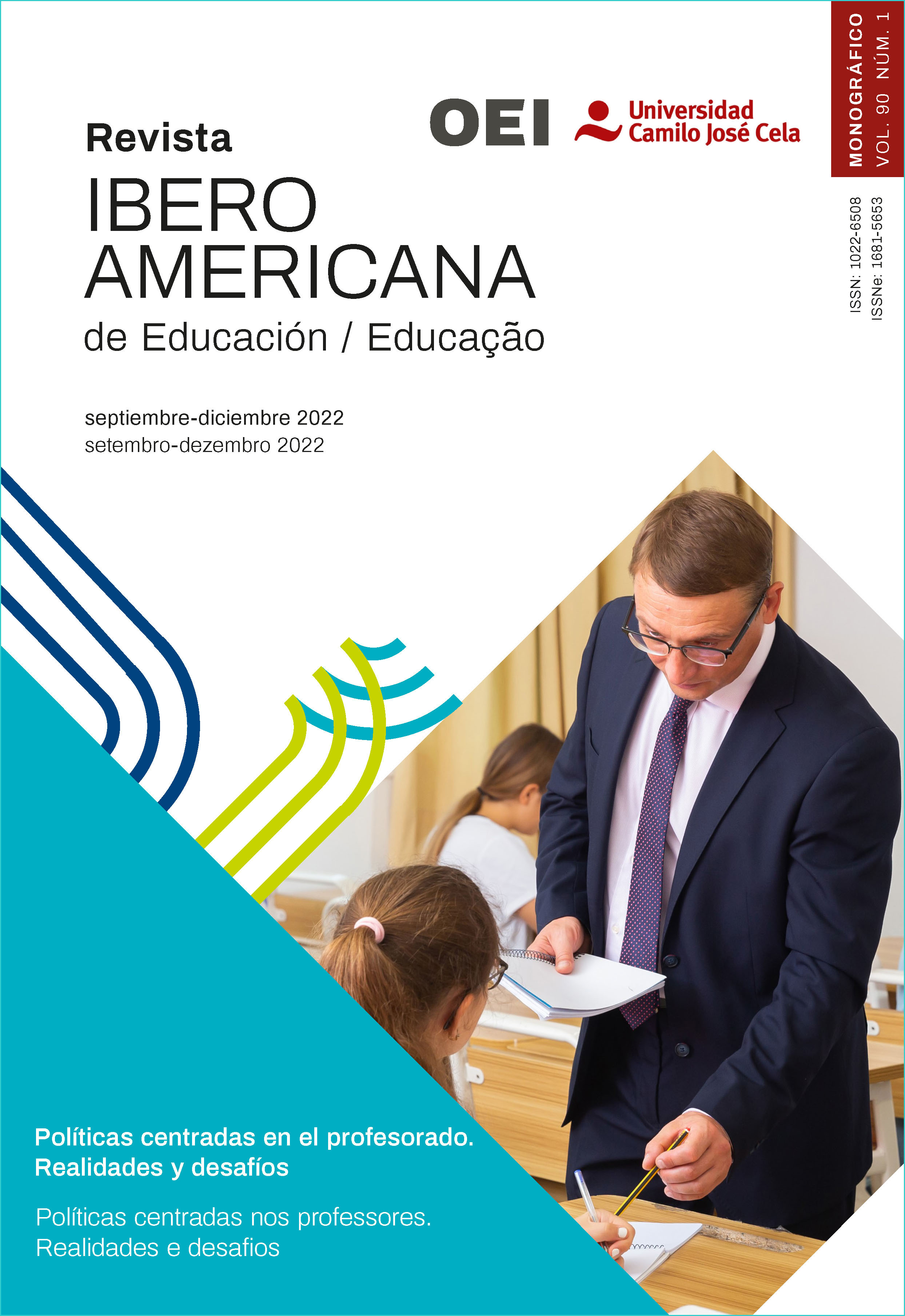O professor no centro do debate sobre a eficácia do ensino: metassíntese do impacto das características do professor
DOI:
https://doi.org/10.35362/rie9015434Palavras-chave:
características do professor; eficácia do professor; meta-análise; revisão sistemática.Resumo
Este estudo visa sintetizar os resultados das evidências acumuladas de um extenso conjunto de pesquisas primárias por meio de estudos de síntese quantitativa e qualitativa (meta-análises e revisões sistemáticas) que examinam a relação entre as características dos professores e as várias medidas de eficácia e qualidade de ensino. Nesta metassíntese, são integrados os resultados de seis trabalhos que facilitam a descrição de suas características em seu próprio contexto, juntamente com uma análise das tendências que transcendem todos eles. Os resultados mostram que as características cognitivas e acadêmicas do professor estão integradas em modelos amplos, embora com impacto muito moderado no melhor dos casos. Os estudos sobre motivação são essencialmente descritivos, embora permitam fazer comparações com base no contexto socioeconômico e cultural dos professores, graças ao uso de ferramentas comuns de medição. Esta metassíntese destaca a necessidade de mais pesquisas em larga escala com instrumentos validados e amostras comparáveis. Porém, sobretudo, são necessárias pesquisas com base teórica sólida que abordem de forma integrada os efeitos precisos das características do professor na qualidade do ensino.
Downloads
Referências
* Aloe, A. M. y Becker, B. J. (2009). Teacher verbal ability and school outcomes: where is the evidence? Educational Researcher, 38(8). 612-624.
Atteberry, A., Loeb, S. y Wyckoff, J. (2015). Do first impressions matter? Predicting early career teacher effectiveness. AERA Open, 1(4), 1–23.
*Bardach y Klassen (2020). Smart teachers, successful students? A systematic review of the literature on teachers’ cognitive abilities and teacher effectiveness. Educational Research Review, 30, 1-21.
Chetty, R., Friedman, J.N. y Rockoff, J.E. (2014). Measuring the impacts of teachers I: Evaluating bias in teacher value-added estimates. The American Economic Review, 104, 2593-2632.
Cohen, J. (1988). Statistical power analysis for the behavioral sciences (2º ed.). Hillsdale, NJ: Erlbaum.
Coleman, J. S., Campbell, E. Q., Hobson, C. J., McPartland, J., Mood, A. M., y Weinfeld, E D. (1966). Equality of educational opportunity. Washington, DC: U.S. Department of Health, Education, and Welfare.
*D’Agostino, J. V. y Powers, S. J. (2009) Predicting Teacher Performance with Test Scores and Grade Point Average: A Meta-Analysis. American Educational Research Journal, 46(1), 146-182.
Darling-Hammond, L. (2010). Teacher education and the American future. Journal of Teacher Education, 61, 35-47.
*Fray, L. y Gore, J. (2018). Why people choose teaching: A scoping review of empirical studies, 2007–2016. Teaching and Teacher Education, 75, 153-163.
Gill, B., Shoji, M., Coen, T. y Place, K. (2016). The content, predictive power, and potential bias in widely used teacher observation instruments (REL 2017-191). Regional Educational Laboratory Mid-Atlantic.
Grissom, J.A. y Loeb, S. (2017). Assessing principals’ assessments: subjective evaluations of teacher effectiveness in low and high-stakes environments. Education Finance and Policy, 12, 369-395.
Hamre, B.K, Pianta, R.C., Downer, J.T., DeCoster, J., Mashburn, A.J. y Hamagami, A. (2013). Teaching through interactions: testing a developmental framework of teacher effectiveness in over 4,000 classrooms. The Elementary School Journal, 113, 461-487.
Hattie, J. A. (2008). Visible Learning: A Synthesis of Over 800 Meta-Analyses Relating to Achievement. Routledge
Hattie, J. A. (2011). Visible Learning for Teachers: Maximizing Impact on Learning. Routledge.
*Heinz, M. (2015). Why Choose Teaching? An International Review of Empirical Studies Exploring Student Teachers’ Career Motivations and Levels of Commitment to Teaching. Educational Research and Evaluation, 21(3): 258–297.
Hobson, A.J., Ashby, P., McIntyre, J. y Malderez, A. (2010). International approaches to teacher selection and recruitment. OECD education working papers. OECD Publishing nº 47.
Jackson, C.K., Rockoff, J.E. y Staiger, D.O. (2014). Teacher effects and teacher-related policies. Annual Review of Economics, 6, 801-825.
*Klassen, R, y Kim, L. E. (2019). Selecting teachers and prospective teachers: A meta-analysis. Educational Research Review, 26, 32–51.
Klassen, R.M. y Tze, V.M.C. (2014). Teachers’ self-efficacy, personality, and teaching effectiveness: a meta-analysis. Educational Research Review, 12, 59-76.
Kunter, M., Kleickmann, T., Klusmann, U. y Richter, D. (2013). The development of teachers’ professional competence. In M. Kunter, J. Baumert, W. Blum, U. Klusmann, S. Krauss y M. Neubrand (Eds.). Cognitive activation in the mathematics classroom and professional competence of teachers (pp. 63-77). Springer.
Van der Lans, R.M., van de Grift, W.J. y van Veen, K. (2018). Developing an instrument for teacher feedback: using the Rasch model to explore teachers’ development of effective teaching strategies and behaviors. The Journal of Experimental Education, 86, 247-264.
Lankford, H., Loeb, S., McEachin, A., Miller, L. C., y Wyckoff, J. (2014). Who Enters Teaching? Encouraging Evidence That the Status of Teaching Is Improving. Educational Researcher, 43(9), 444–453.
Mujis, D., Kyriakides, L, van der Werf, G., Creemers, B., Timperley, H. y Earl, L. (2014). State of the art -teacher effectiveness and professional learning. School Effectiveness and School Improvement, 25, 231-256.
Mujis, D., Reynolds, D., Sammons, Creemers, B. y Teddie, C. (2018). Assessing individual lessons using a generic teacher observation instrument: how useful is the international system for teacher observation and feedback (ISTOF)? School Effectiveness and School Improvement, 25, 231-256.
OECD (2005). Teachers matter. Attracting, developing, and retaining effective teachers. OECD education working papers. OECD Publishing.
Walsh, D. y Downe, S. (2005). Meta-synthesis method for qualitative research: a literature review. Journal of Advanced Nursing 50(2), 204–211.
Watt, H.M.G. y Richardson, P.W. (2012). An introduction to teaching motivations in different countries: comparisons using the FIT-Choice scale. Asia-Pacific Journal of Teacher Education, 40(3), 185-197
Como Citar
Publicado
Edição
Secção
Licença
Os(as) autores(as) que publiquem nesta revista concordam com os seguintes termos:















